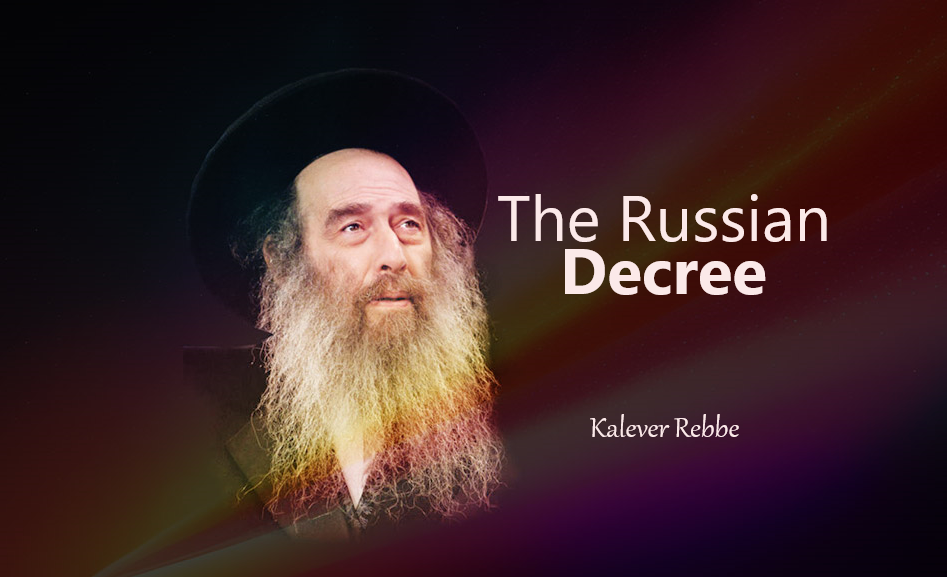
Don’t Be A Fool!
Often it happens that when a person begins to do teshuvah, his life becomes very difficult. Problems seem to appear from nowhere! Why should such things happen to a person who is trying to come closer to Hashem?! The Kalever Rebbe explains the ultimate blessing in these tests...

And now do not fear, I will provide for you and for your little ones.” (Bereishit 50:21)
The Bitterness at the Seder
R’ Nachman of Breslev, zt”l, would often relate the following story at the Pesach Seder:
There was once a poor Jewish man who traveled from place to place, seeking the generosity and charity of others. One day, he met a non-Jew who was doing the same, and they quickly became friends. They decided to travel together wherever they went.
It was Erev Pesach, and the Jewish man told the non-Jew, “Tonight is Pesach. Let’s go to the shul in town and we will certainly find Jews there who will take pity on us. They will invite us into their homes to join their Seder as their guests and we can participate in the festive meal! For you to fit in, let me teach you about the customs.”
He taught him the proper way to recite Kiddush, how to wash hands, and other rituals, however, he forgot to tell him that they would be eating maror, the bitter herbs, right before the meal.
They went to shul that night, and someone invited the Jewish man to his Seder as a guest, while another person invited the non-Jewish friend, believing that he was Jewish as well.
The non-Jew had not eaten all day and was eagerly anticipating the festive meal he was promised. First, they gave him a piece of karpas, a vegetable dipped in saltwater, but it did little to satisfy his hunger. Then, they recited the Haggadah at length, and after what seemed like an eternity, they washed their hands and handed him a piece of matzah. He was thrilled, thinking that his friend had told him this was the sign that the meal was about to begin.
But then, the first thing they served him was so bitter! The sharpness of the bitterness brought tears to his eyes. He thought to himself, “This is the delicious meal I was promised?!”
“Cursed Jews! After the long Seder, all you serve is this bitter food!” he angrily shouted as he stormed out of the house.
He went back to the shul to wait for his friend to come back from his meal. When his friend returned much later in the evening, happy and full, the non-Jew began to give him a proper rebuke for such a foolish idea.
His Jewish friend replied, “You are such a fool! If you had waited just a little longer, you would have a good meal with a variety of delicious foods just like me!”
R’ Nachman of Breslev would conclude the story by saying: “The same is true of a Jew’s Avodat Hashem (service of Hashem). When a person starts going on the path of Avodat Hashem, serving Hashem, there may be some bitterness. However, it is for their own good. It helps to purify the body and atone for any sins. Those who can endure the bitterness and wait a little longer, will surely experience all kinds of goodness, brachot, and sublime pleasure, both materially and spiritually.”
Difficulties at First
R’ Yonatan Eibeschitz, zt”l, discusses a similar idea in Yaarot Devash (Volume 1, Drush 1). He writes that sometimes we see that when someone starts becoming a Baal Teshuvah and he is in the beginning of his journey, he starts to encounter difficulties. For example, when someone is wealthy and they start to become Torah observant, they start to lose their wealth. Many times, the reason for this is that Hashem wants to test the person to see if he truly intends to return and repent. If he overcomes the test and continues to strengthen himself in Torah and mitzvot, then in the end, his wealth will return, even more than before.
The Example of Yosef
We see this clearly with Yosef:
When he was a young man, he was sold as a slave in Egypt. And, while being a slave, Potiphar’s wife tried to tempt him to sin. She promised him a thousand pieces of silver; the equivalent of millions of dollars. He knew that if he withstood her temptations and refused to sin, he would face imprisonment – which was a very deep pit – forever. But Yosef answered: “How can I commit such an evil sin against Hashem?!”
Yosef’s reasoning was that since Hashem governs all creation, and He wants him to observe His commandments, if Hashem wants to give him money, He will do so in a proper way. He wouldn’t need to sin to become wealthy. He knew that if he accepted wealth in an impermissible way, it would eventually lead to nothing.
After Yosef stood firm and overcame this test, he was sent to prison. Everyone ridiculed him, saying, “Where is Hashem who lets you be in prison for keeping His commandments? Why hasn’t he rewarded you with freedom?”
He remained undeterred. He remained faithful to his belief that everything that occurs in this world happens with Divine Providence and Heavenly calculations. During these twelve years in prison, he continually reviewed the Torah he had learned when he was young, and he continued growing in his Torah knowledge and righteousness.
Then, Hashem demonstrated that from the bitterness comes sweetness. In a few short hours, he rose in stature from being a prisoner with a life sentence to becoming the viceroy of the king, ruling the entire kingdom. This was unparalleled in history.
Yosef’s experience and example impacted the millions of Jews keeping them from assimilating during their long and painful exile in Egypt. They saw with their own eyes that even when it seems like a person is suffering for adhering to kedusha and holiness, by waiting patiently a person ultimately sees that the Hashem rewards such patience, both in this world and in the next.
Based on this, we can interpret Yosef’s message to his brothers:
“And now…” – hinting to teshuva, as our sages say (Bereishit Rabbah 21:6) that the expression “and now” always refers to teshuva.
“Do not fear…” – do not be afraid of repenting because you think that you will lose out and suffer for it.
“I will provide for you and for your little ones…” Meaning that Yosef will serve as an example that can sustain the Jewish people spiritually for generations to come, that when a Jew strives to maintain his holiness and observe the mitzvot, he will gain in the end.
***
The Kalever Rebbe is the seventh Rebbe of the Kaalov Chasidic dynasty, begun by his ancestor who was born to his previously childless parents after receiving a blessing from the Baal Shem Tov zy”a, and later learned under the Maggid of Mezeritch zt”l. The Rebbe has been involved in outreach for more than 30 years and writes weekly emails on understanding current issues through the Torah. Sign up at www.kaalov.org.












Tell us what you think!
Thank you for your comment!
It will be published after approval by the Editor.